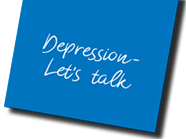What can a GP do about depression?
Depression is often underdiagnosed and undertreated in primary care. Those experiencing depressive symptoms might be reluctant to seek help. When they do present to primary care, their health care professional might overlook depression because of a misunderstanding of somatic symptoms (up to two-thirds of symptoms reported are somatic), comorbid substance misuse, reluctance to report affective symptoms, or uneasiness with management of the diagnosable disorder. Once depression is diagnosed, it is best practice that it is managed by the general practitioner but this may be hampered by restricted availability of psychotherapy, inappropriate or inadequate pharmacotherapy, or poor adherence.
The first step is to establish whether a patient is experiencing a depressive episode. Depending on the severity of the depressive episode, the best approach is to start a pharmacotherapy or psychotherapy to improve and sustain normal mood. In severe depression, pharmacotherapy is first choice in most patients. Often a combination of pharmaco- and psychotherapy should be recommended.
More detailed information on depression screening, diagnosis, and treatment is available in the next sections.



